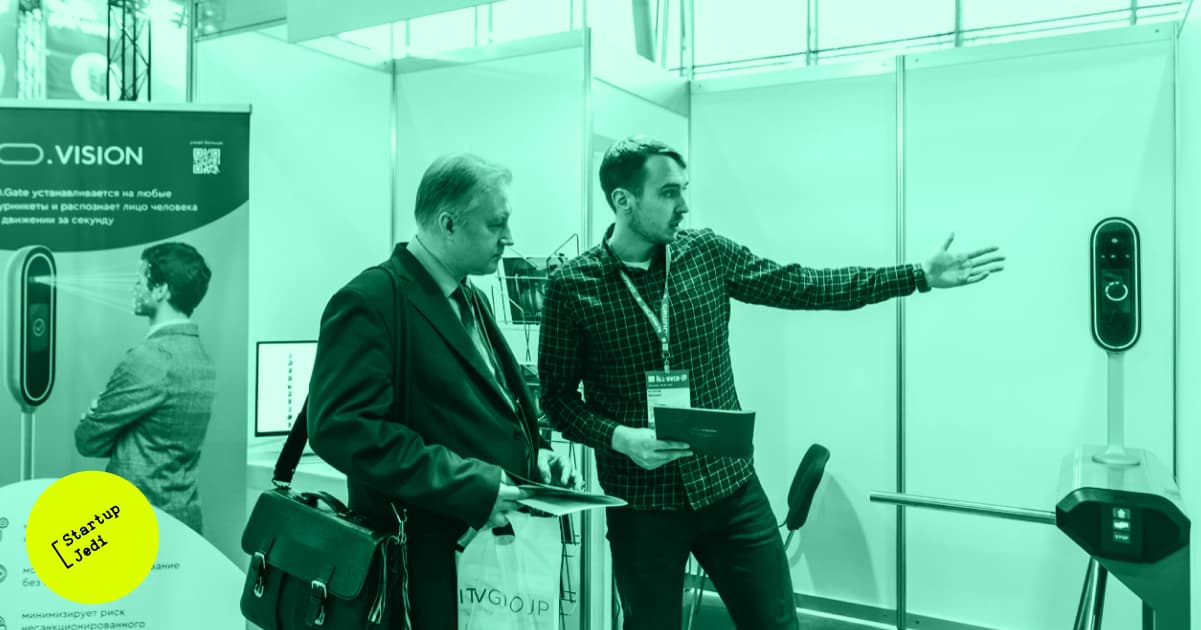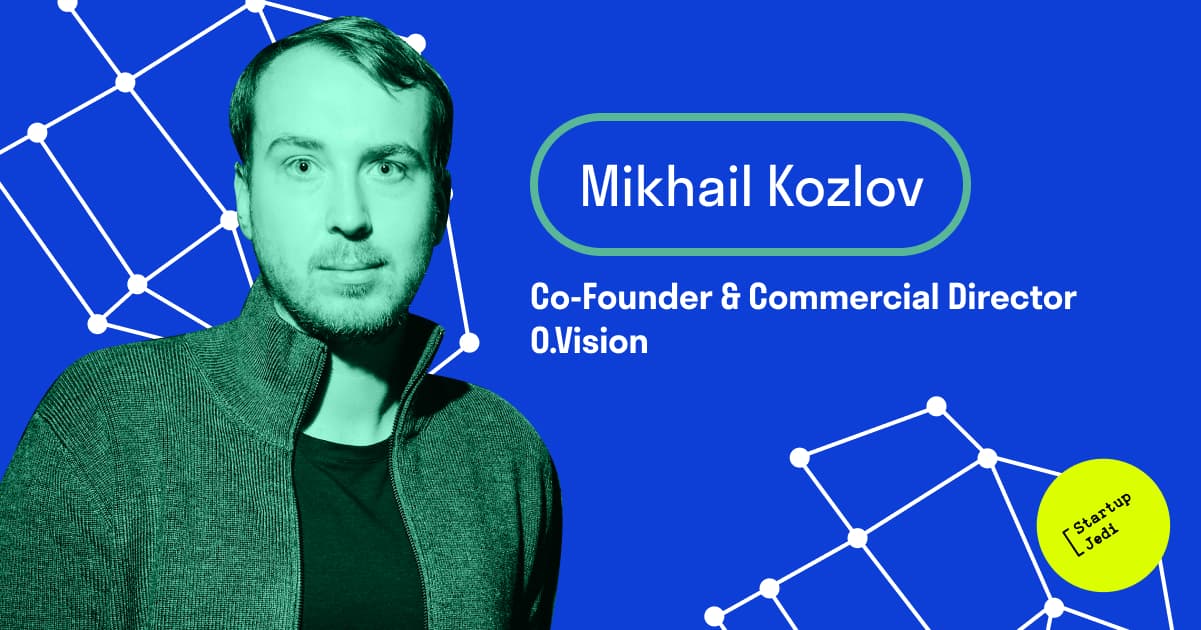
Startup Jedi
We talk to startups and investors, you get the value.
Many people have usual metal keys and chip-keys in their pockets, but this is about to change quite soon. Access control enabled by biometrics is a new era. That’s specifically how O.Vision founders were thinking, while launching their startup two years ago. Now the startup has its own face recognition technology, its own access control systems’ production based on it, millions of sales and a plan to enter the US market. Mikhail Kozlov, co-founder and commercial director of O.Vision, talked about the product and a new round of investments.

Startup Jedi
We talk to startups and investors, you get the value.
Our face is the most convenient and reliable key. You won’t forget it at home, and you can only lose it in a figurative sense — in contrast to the usual keys, passes and tickets. We are creating an ecosystem that will allow you to go everywhere using facial recognition: to the office, to the gym, on the subway, to a concert and many other places.
It is enough to register biometric data once. This can be done by the user himself through our mobile application or by the system administrator through the web interface.
The biometric data in our database is encrypted and impersonal. Even if someone gains unauthorized access to them, it will not be possible to learn something important about the users. And, of course, you can’t deceive the system and walk through the photo instead of a real face.
Our O.Gate and O.Gate S facial recognition devices are already operating at the entrances of dozens of business centers and pass over 30,000 people daily. We are currently working on devices for rental housing and transport.
The facial recognition algorithm is able to identify a person who has put on glasses or a headdress, dropped a beard, or in some other way changed his appearance. We can even identify a person in a medical mask. Recognition takes up to 0.5 seconds — you don’t even have to stop. Thanks to this, queues disappear.
...

We’ve spent more than a year developing the product. Along with the co-founder we’ve sold the business (and after that we instantly attracted an investment round), gathered a team of engineers and developed a product in 14 months. In April 2020, we started to enter the market with our product.
For the start of sales, we chose office buildings, factories, business centers — at the entrance to many there is an access control system with electronic passes based on radio cards. But they have a specific problem — turnstiles collect queues. Time will pass until everyone finds their passes, until everyone applies them to the reader.
Our entrance equipped O.Gate significantly improves the process. The stylish device recognizes employees by sight quickly and clearly. The impression of the company gets better right from the start. Currently, our main customers are large corporations that put our system at the entrance to offices and production facilities.
When the head office of Russian Railways (RR) switched to our system, many heads of the company’s structural divisions and its partners wanted to implement O.Gate in their offices. We see this viral effect in other orders as well.
The early successes prompted us to expand the target market to all places where it is necessary to control the people’s passage. Mass events, hospitals, educational institutions — in all these areas there is a demand for our solution and implementation cases.
For example, our devices are already working at the Tinkoff Arena in St. Petersburg. The client can immediately register his biometrics using our equipment when buying a ticket and go to the event using it. A regular ticket with a QR code is given only for insurance.
Thanks to face recognition technology, the event organizer significantly saves on ticket control and bracelets. Therefore, we see a demand and are actively working in this direction.
...

We are currently developing in the Russian market, because experience in sales, implementation and service seems to us useful when working in large markets. We don’t waste time in Russia, but we develop the product and develop cases that help sell the product to European and American customers.
My cofounder is now in New York working on the implementation of O.Gate in one of the largest office buildings in the country. There is a project with Hyundai in Germany, a business center in Holland. Coronavirus restrictions prevent us from fully entering these markets. Most of our team simply can’t come to install the equipment.
The coronavirus has deprived us of the opportunity to work at industry conferences, since all scheduled for this year have been canceled. Prior to that, security forums brought us a significant flow of customers.
Corporate accelerators help us a lot. We were able to get to Russian Railways just thanks to their accelerator. Participated in Global Pilots, Slush (got the second place) and other programs.
This is a great opportunity to start working with large companies. The accelerator’s attitude is much more loyal to a startup than to a contractor who came from the street and is trying to sell something.
We started working with Russian Railways thanks to the accelerator. They expected to see a large clumsy colossus, and as a result, three pilots in a month and a half and a contract for tens of millions of Russian rubles. Surprisingly, the management was very open to innovation.
I would especially like to recommend the Global Pilots program. With the right focus and well-organized process, you can gain the real value. The organizers were able to turn the participants of the track into a living community of cool entrepreneurs, and also bring them together with representatives of large corporations.
...

We have been building a full-cycle company since the beginning of the O.Gate development. We develop software, manufacture hardware, sell, install and service finished devices.
This is our competitive advantage — we make every part of the system better. Our recognition algorithm is the fastest on the market and our hardware completely matches it. Only in a combination of hardware and software you can achieve a high quality product.
Having a control over all the components gives flexibility. We can make much more product improvements or customizations for the client than competitors who only have their own software.

Facial recognition algorithms are very similar to each other, because they use the same libraries and are based on the same scientific works. The difference shows up in how the system is trained and how the data is prepared. The market leaders have much better recognition results. In particular, only a few companies can recognize a partially hidden or altered face.
At first we had one table, then a small room, then a bigger room, the first soldering station. Gradually we hired specialists, grew up together and now we have our own production in St. Petersburg. There are more than forty people in the team today.
We make 75% of the product in Russia. We manufacture printed circuit boards, camera modules, cables by ourselves. The cases are produced in Voronezh, the front glass in St. Petersburg. We only have an Nvidia neural computer and camera imported from the outside.
...

We work in a complex market, and entry requires strong expertise in machine learning, computer vision, electronics. Few can overcome this threshold, and I don’t see many new competitors. The ocean turns red slowly.
There are several strong players in the market, who we keep track of. Vision labs, the Russian company, that began developing the product before us and has already attracted investments from Sberbank in the A Round. Sberbank is their main customer, and the team spends most of its efforts on solving their cases. But they also release their own solution for access control based on face recognition.
Hikvision from China is the largest manufacturer of surveillance cameras in the world, also makes terminals with face recognition technology. They’re doing great but Hikvision has problems with integration in Russia: Chinese hardware and Chinese software are difficult to install into our IT systems. Also, the company cannot operate in the US and EU due to the sanctions.
There are several manufacturers who buy ready-made devices in China, install their software and then they make it a brand. It turns out cheaper than ours, but the quality of such devices is much worse than ours.
A fresh solution from Amazon — palmprint recognition, which is not really our competitor. This system requires you to stop and bring your palm to the reader. The magic of the passage disappears without stopping.
We set ourselves the goal of reaching a sales level of 100 million Russian rubles by the end of this year. It turns out that we will cross this level in eight months of sales. We can’t move slower, otherwise we will remain a small startup that will never grow into a large corporation.
...

There are many good specialists in the field of machine learning and computer vision in Russia. Technical university after Bauman, ITMO, Polytechnic university, LETI and other universities graduate outstanding professionals every year. In the USA it would be more difficult and much more expensive to assemble a team of our level.
We have to compete for employees with large companies that are willing to pay twice more on the market. In response, we lure people with emotions, cool atmosphere, and an interesting product. Employees enjoy working with us. Those who are not interested in our common cause don’t usually linger.
The project was launched by three founders. As I’m a CCO, I am in charge of the entire business. Oleg Novikov, our CTO, leads the entire product development. Daniil Sazonov, is also engaged in business development.
Oleg and I launched a grocery delivery service six years ago, when it wasn’t a mainstream yet. We didn’t attract enough investment into this project and changed the vector to offline catering. For two years, we have been engaged in restaurant projects, which have successfully sold and invested in O.Vision.
When we left the previous project, we decided to move to open markets, to look for blue oceans. Face recognition is one of those, and the field will develop rapidly in the upcoming years.
...

At the start, we raised money from private investors and the investment amount was over $1 million. We raised investments from Europe and into our European legal entity.
We are now planning to enter the US market. For a competent start there you need to open your own production and expand the team. At the same time, we plan to enter the EU market, and now we are confirming the demand with our first projects there.
The first counts concluded that we would need $5–10 million. The exact amount is now being calculated. We will raise these funds in round A, which we plan to close in the first quarter of 2021. We are looking for an investor with expertise in computer vision or security systems.
Facebook: facebook.com/StartupJedi/
Telegram: t.me/Startup_Jedi
Twitter: twitter.com/startup_jedi
Comments